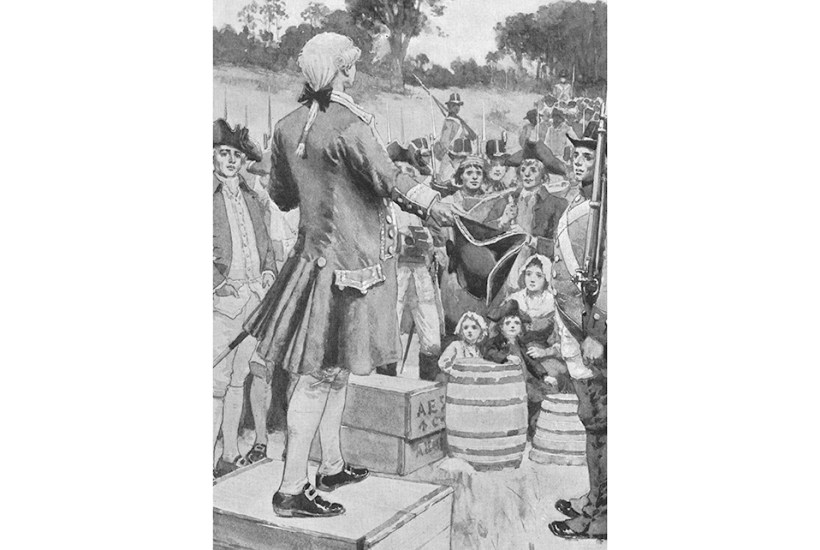A class system is inevitable. Its most odious form can be found in any communist ‘paradise’, a fact well described in Orwell’s Nineteen Eighty-Four. Changes in the Australian class system are surprisingly going down that path.
The outward difference between the Australian (and NZ, US and Canadian) class system and the British is the lack of a titled aristocracy, despite the efforts of the father of freedom of our press, William Charles Wentworth. At a time when it is fashionable to denigrate the British, we should remember, as John Howard reminded us, how fortunate Australians are that the British colonised this continent, for had they not, inevitably some other power would have. Colonialism, like slavery, was never just European, it was universal. While no one denies Aborigines were here before settlement, the view that there were people here before them is now a minority view. Given the fabrications demonstrated in Keith Windschuttle’s writings referred to in interviews on ADH TV, it is not unreasonable to wonder whether studies about this have been suppressed.
The British were, demonstrably, the best colonial power. Although New South Wales was a penal colony, the rule of law prevailed. Governor Arthur Phillip was even armed with a Charter of Justice. In a co-authored book in 2014 , Give Us Back Our Country, we tell the fascinating story behind the first civil case in the colony brought successfully by two recently married convicts against a ship’s captain. Consistent with the now abandoned standard that justice delayed is justice denied, the captain was immediately brought before the Court of Civil Jurisdiction. Evidence was heard on oath by a bench of three. The Judge Advocate, David Collins, a man of a most caring disposition, presided. A colonel in the Marines, Collins was not a lawyer. He was, however, armed with a small law library. An interesting aspect of the case was that under English law at the time, convicts lost the right to sue. Collins must have considered this as the convict, Henry Cable – later very successful in business – is described as a ‘labourer’. A report of this case can be studied today, the citation being Cable v. Sinclair [1788] NSWKR 7.
Can anyone imagine, in the gulags and concentration camps of those many dark and evil powers which exist even today, such a process being followed?
Returning to Wentworth’s attempts to establish a peerage, we should note that this was in response to the British decision, a mere six decades from the foundation, to grant the Australian colonies self-government.
This was in fact an old British tradition, preceding even American independence.
It is not usually appreciated that the American colonies were probably the freest the world had ever seen. Nor was the dispute limited to Britain’s ham-fisted attempts to recoup some of the costs of defending the colonies against the French.
The king was not influenced by divine right, his concern was the sovereignty of Parliament. In addition, the British were beginning to question the very institution of slavery. This arose especially in the context of colonists visiting London bringing slaves to serve them. With the encouragement of Christian abolitionists, slaves sometimes absconded. In one case to recover a slave in 1772, Somerset v. Stewart, Lord Mansfield ruled, in magnificent words attributed to him that, ‘The air of England is too pure for a slave to breathe; let the black go free.’ The colonists were right to fear this. The British were to go further than any power in the world in not only ending slavery in their possessions, but in using the Royal Navy, vigorously and at great cost, to stamp out the Atlantic slave trade.
Then there was George III’s Royal Proclamation of 7 October 1763 declaring all lands west of the Appalachian Divide reserved to the Indians. The result was that British lost both slave-owners and all those hankering after Indian land.
So granting self-government so soon to the Australian colonies was hardly out of character. To learn how best to do this they had commissioned Lord Durham to produce a major report on Canada. What was unusual was that they then actually invited the Australian colonies to submit drafts to London.
Wentworth’s proposal for a colonial peerage, ridiculed as a ‘bunyip aristocracy’, was in this context. Just as Alexander Hamilton at Philadelphia tried to copy the British constitution, so did Wentworth, probably the most capable colonial politician then.
His plan was to control the legislature by making the upper house a local House of Lords forever under the control of the squattocracy. The opposition was too great for even Wentworth, but he did succeed in making the upper house nominated.
As a boy, I remember the descendants of the squattocracy, still an upper class, coming down to Sydney en masse for the Royal Easter Show. The richest and most powerful, owners also of department stores and newspapers, were in Sydney for much of their time with new money being gradually added to their ranks. But most came from their sheep stations, shopping at the ‘universal provider’, Anthony Hordern’s, the men drinking in the famous Long Bar of the Hotel Australia, and also in the nearby Carlton, Ushers and Pfahlert’s Hotels. Looking far healthier than city folk, they wore broad-brimmed Akubra hats, woollen ties, moleskin trousers and boots. Egalitarian by nature, they mixed easily with everyone else. Often church-going, their beliefs and their ethics were fundamentally sound. Any racism in those years centred on a unionist and Labor obsession to defend living standards from undercutting by Asians. This was expressed in the startling front-page banner of that great journal, the Bulletin: ‘Australia for The White Man’. Kerry Packer took that down as soon as he bought it.
The old ruling class never thought of taking away the rights of other Australians or pushing their views onto them. How different the new secretive ruling class is. I shall look at that topic next week.
Got something to add? Join the discussion and comment below.
Get 10 issues for just $10
Subscribe to The Spectator Australia today for the next 10 magazine issues, plus full online access, for just $10.
You might disagree with half of it, but you’ll enjoy reading all of it. Try your first month for free, then just $2 a week for the remainder of your first year.














Comments
Don't miss out
Join the conversation with other Spectator Australia readers. Subscribe to leave a comment.
SUBSCRIBEAlready a subscriber? Log in